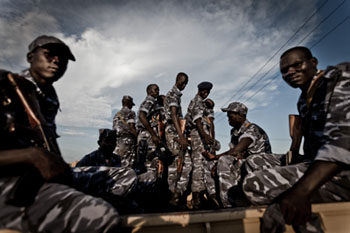
JUBA, South Sudan — Taking the first of many steps deemed necessary by the international community for bringing South Sudan and Sudan back from the brink, the South Sudan government has pulled out its police forces from the Abyei area. The move, which was confirmed by U.N. peacekeepers on the ground officially on May 10, follows on decisions from both the African Union and the United Nations that redeployment “of all Sudanese and South Sudanese forces out of the Abyei Area” should take place within two weeks—or, by today.
The U.N.-A.U. decision is only the most recent international attempt aimed at de-militarizing the volatile border region of Abyei. While South Sudan’s police forces have verifiably withdrawn, Sudan’s army, the SAF, still maintains a 300-strong force in Abyei town.
Just a year ago, the Sudan army responded disproportionately to an alleged southern ambush in Abyei and invaded and occupied the area whose status—whether it belongs to the North or the South—is yet to be determined. The SAF occupation, which included widespread looting and destruction of civilian properties, brought the two sides close to all-out war, just ahead of South Sudan’s independence. In response, the international community pushed through a temporary agreement on Abyei in June 2011 that, as one of its key provisions, called for the immediate withdrawal of all Sudanese and South Sudanese forces. Regardless, SAF forces remained in Abyei.
Following the June agreement, Sudanese and South Sudanese representatives later agreed to a timetable that would result in the full redeployment of both armies outside of the Abyei area by the end of September 2011. The Khartoum government resisted. Sudanese officials argued that SAF withdrawal could only take place once the U.N. peacekeeping mission, or UNISFA, was fully deployed, though no conditions related to that position were stipulated in either the June agreement or September timetable. Over time, Sudanese officials began saying that full withdrawal was conditioned on the formation of the Abyei administration. The establishment of the Abyei administration has been held up because of an impasse between the two sides over the appointment of the speaker of the legislative council.
At the same time, South Sudan police also remained in the area, raising questions of whether the police were simply SPLA in different uniform—an issue that has arisen in Abyei in the past. Southern officials claimed that the police, comprised of the local Ngok Dinka population, were present to maintain law and order. But now, South Sudan has withdrawn its police.
On a practical level, it appears that the UNISFA peacekeeping force has been relatively successful as securing the area, despite the SAF presence. In a press conference in Juba on Tuesday, Dr. Luka Biong, South Sudan’s chief representative in a bilateral North-South committee mandated with administering the Abyei area, said that UNISFA has done a “splendid job” despite the security challenges posed. But, over 100,000 Ngok Dinka displaced from the attacks last year will remain displaced, because of the potential for insecurity that the continued SAF presence poses.
On a symbolic level, Khartoum’s continued resistance to withdrawal will be viewed as a first test of the international community’s ability to enforce the A.U.-U.N. roadmap aimed at bringing Sudan and South Sudan back from the brink, and with that, its credibility as a mediator of North-South issues going forward. Just two days ago, Sudanese officials once again reiterated that SAF withdrawal from Abyei could take place only after the formation of the Abyei administration. In response, southern officials are warning that if Sudan does not withdraw its forces from Abyei, the southern army will have to be redeployed back into the region.
If the international community fails to push Khartoum to implement this first piece of the A.U.-U.N. roadmap, how seriously will either Juba or Khartoum approach the implementation of the remaining provisions going forward?
Photo: South Sudan police in Abyei in 2011 (Enough / Tim Freccia)

